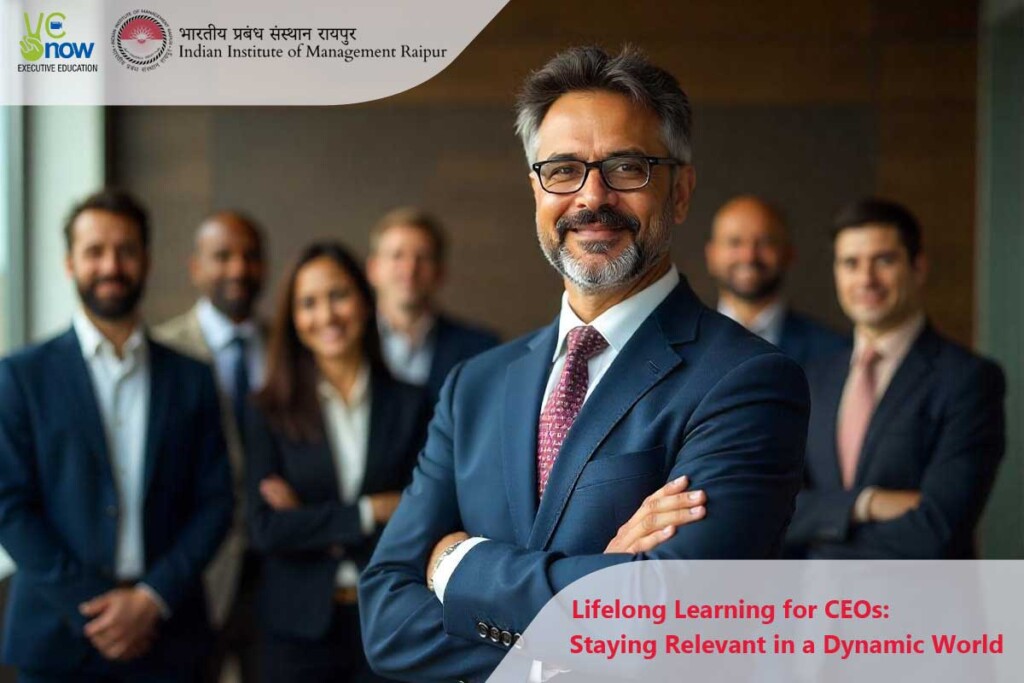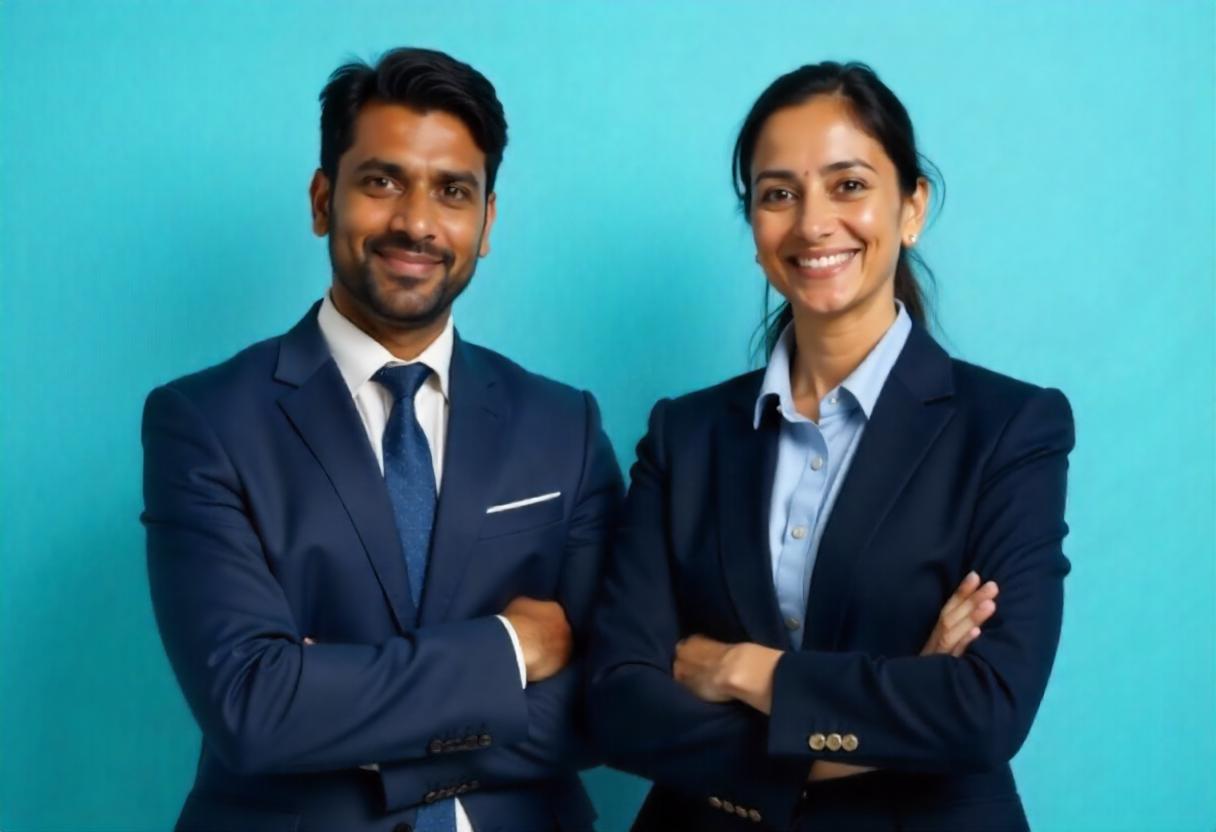
1. Introduction
In today’s rapidly evolving business landscape, the role of the CEO is more demanding and complex than ever before. Disruptive technologies, globalization, and increasing competition require leaders to be agile, adaptable, and continuously learning.
This article explores the critical importance of lifelong learning for CEOs and how IIMR’s Executive Certificate Programme for CEOs – Leadership at Peak empowers leaders to navigate the complexities of the modern business world.
2. Why Lifelong Learning is Essential for CEOs
The evolving role of CEOs demands a constant pursuit of knowledge and skill development. Staying ahead of the curve is crucial for:
- Navigating Disruptive Technologies: Embracing digital transformation, leveraging AI, and understanding emerging technologies are critical for business survival and growth.
- Adapting to Changing Market Dynamics: The business landscape is constantly shifting. CEOs must stay abreast of new market trends, customer demands, and competitive pressures to maintain a competitive edge.
- Leading with Innovation: Fostering a culture of innovation requires leaders to continuously explore new ideas, challenge the status quo, and embrace experimentation.
- Building High-Performing Teams: Developing and nurturing a diverse and skilled workforce requires leaders to possess strong emotional intelligence, communication, and coaching skills.
- Maintaining a Competitive Advantage: In a globalized economy, continuous learning is essential to gain and maintain a competitive edge over rivals.
3. Key Challenges Faced by CEOs in Staying Relevant
Staying relevant in today’s fast-paced world presents significant challenges for CEOs, including:
- Time Constraints: Balancing demanding leadership responsibilities with the time required for continuous learning can be a significant challenge.
- Information Overload: The sheer volume of information available can be overwhelming, making it difficult to identify and prioritize relevant learning opportunities.
- Adapting to New Technologies: Embracing new technologies and integrating them into business operations can be daunting for some leaders.
- Navigating the Complexity of Global Markets: Understanding and navigating the complexities of global markets, including cultural differences and regulatory environments, requires ongoing learning and adaptation.
- The Risk of Stagnation: In a dynamic environment, complacency can be detrimental. Leaders must constantly evolve their leadership styles and approaches to remain effective.
4. The Role of Lifelong Learning in Overcoming These Challenges
Lifelong learning empowers CEOs to overcome these challenges by:
- Enhancing Strategic Thinking and Decision-Making: Continuous learning provides leaders with the knowledge and tools to make informed strategic decisions, anticipate future challenges, and navigate uncertainty.
- Building Emotional Intelligence and Adaptability: By developing their emotional intelligence, leaders can better understand and connect with their teams, build strong relationships, and effectively navigate challenging situations.
- Developing Resilience to Handle Uncertainty and Crises: Continuous learning equips leaders with the mental fortitude and adaptability to navigate unexpected challenges and lead their organizations through crises.
- Embracing Diverse Perspectives: Engaging in diverse learning experiences exposes leaders to different perspectives and encourages innovative thinking.
5. How IIMR’s Executive Certificate Programme Empowers CEOs
IIMR’s Chief Executive Officer Program provides a comprehensive framework for leadership development, focusing on key aspects:
Understanding Leadership:
- Concept of Leadership and Change Management: Explores the evolving nature of leadership and its crucial role in driving organizational change and navigating uncertainty.
- Leadership Theories: Delves into various leadership theories, examining their strengths and weaknesses, and their applicability in different contexts.
- Linkage between Leadership and Change in times of crisis/success/failures: Analyzes how effective leadership can navigate challenges, capitalize on opportunities, and learn from both successes and failures.
Developing the Leader Within:
- Skills for developing oneself as a leader: Focuses on self-reflection, personal growth, and developing essential leadership qualities such as self-awareness, emotional intelligence, and resilience.
- Power and Influence: Explores the dynamics of power and influence within organizations, equipping leaders with the skills to effectively navigate and leverage these dynamics.
- Leadership Ethics and Values: Emphasizes the importance of ethical leadership, fostering a strong moral compass, and building trust and credibility.
- Leadership Attributes and Behaviour: Examines key leadership attributes and behaviors, such as decisiveness, communication, and accountability, and provides practical strategies for developing these qualities.
- Skills for building Personal Credibility: Focuses on building trust, establishing credibility, and demonstrating integrity in all interactions.
Leading High-Performing Teams:
- Motivation and Performance Management: Explores strategies for motivating and engaging teams, setting clear expectations, and providing constructive feedback.
- Team building: Focuses on fostering high-performing teams through effective communication, collaboration, and conflict resolution.
- Skills for Developing Others: Equips leaders with the skills to mentor, coach, and guide team members in their professional development.
The Role of Technology in Leadership:
- Integrating Technology for Leadership: Explores how technology can be leveraged to enhance leadership effectiveness, including the use of data analytics, communication tools, and digital platforms. Understanding the impact of technology on leadership styles and organizational structures.
By covering these critical areas, IIMR’s CEO Programme provides a comprehensive framework for leadership development, empowering CEOs with the knowledge, skills, and confidence to navigate the complexities of the modern business world.
6. Strategies for CEOs to Cultivate Lifelong Learning
In addition to enrolling in executive programs like IIMR’s, CEOs can cultivate lifelong learning through various strategies:
- Embracing Mentorship and Reverse Mentoring: Engaging with mentors and seeking guidance from younger professionals can provide valuable insights and fresh perspectives.
- Leveraging Technology: Utilize online courses, webinars, podcasts, and industry publications to stay updated on the latest trends and best practices.
- Building a Habit of Reading: Regularly reading books, articles, and industry reports can broaden knowledge and expand perspectives.
- Networking with Global Leaders: Participating in industry conferences, attending executive summits, and networking with other leaders can provide valuable insights and foster new connections.
7. Success Stories of Lifelong Learners
Numerous successful CEOs attribute their success to a commitment to lifelong learning.
Hear it from our Alumni
Hear it from our Alumni
Hear it from our Alumni
8. Why should you Join the IIMR’s Leadership Program for CEOs
IIMR’s Chief Executive Officer Program is designed for senior professionals with over 10 years of experience who are committed to personal and professional growth. This IIMR CEO program offers a unique opportunity to senior leaders to:
- Unique Pedagogy: The live sessions of this programme are designed with a specific intent for participants to learn from practitioners who are (or have been) at the helm of leadership. Each session will therefore have a different “leader in practice” from different continuity and sectors of society. The session will be anchored by the programme director. The programme director will also play the role of facilitator, threading all the different sessions and speakers together.
- Programme Delivery: The delivery for this programme would comprise a judicious mix of live virtual lectures, discussion, case studies, and experience sharing through peer discussion.
- Enhance your strategic leadership skills: Develops a deep understanding of strategic leadership principles, enabling you to effectively set vision, think strategically, and execute plans.
- Build a strong network of peers: Offers valuable opportunities for peer-to-peer learning and networking with other seasoned professionals (CXOs, CFOs, CEOs) through interactive discussions and group projects.
- Access to World-Class Faculty: Provides access to world-class faculty, including renowned academicians and industry leaders, who bring their expertise and insights to the program.
- Gain a competitive edge in the ever-evolving business world: Stay ahead of the curve. IIMR’s Executive Certificate Programme equips CEOs with the knowledge and skills to navigate the complexities of the modern business landscape and drive organizational success.
Apply Now in IIMR Leadership Program for CEOs and embark on a transformative learning journey that will equip you with the knowledge and skills to lead your organization to new heights.
9. Conclusion
In today’s dynamic and interconnected world, lifelong learning is not just an option for CEOs; it is a necessity. By embracing continuous learning and investing in their own development, CEOs can navigate the complexities of the modern business landscape, drive innovation, and ensure the long-term success of their organizations.
IIMR’s Executive Certificate Programme for CEOs provides a valuable platform for senior executives to enhance their leadership skills, expand their knowledge, and stay ahead of the curve.







